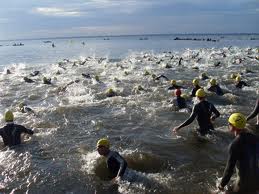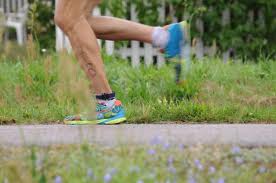It is important to have members with excellent technical skills in most agile projects to succeed deliver desired customer value. But even more important is that the members have great collaborative and communication skills. Without the ability to collaborate efficiently the team will have a tough time to succeed with the project. The soft part of product development includes both how the members act against each other, but also how good they all are in introspectiveness and adaptability. They need this to be able to mature as a team compared to just being a bunch of individuals acting under a common project hat.
There are many ways you can improve your ability to inspect your own behavior and adapt and change it accordingly. Working together with others and asking them to give you feedback is one great way of improving yourselves. Last year I found, a bit surprisingly, another way of improving my skills in collaboration and team work; I took on a personal sport challenge with the goal to perform a race one year ahead. This challenge has learned me a lot about myself and has also improved my collaboration skills.
I have been on several presentations during the years where well known athletes talked about what they have learned after several years of hard training and exercises. I have always found these presentations interesting. I admire people that are really dedicated to what they are doing and who are pushing themselves beyond the normal to succeed. They have also in general been good presenters with a lot of energy and sometimes also funny. But I have also been quite skeptical to their conclusions and comparisons with the working life and the challenges we have to face in our profession. One thing that made me skeptical was that the athletes have often competed in individual sports whereas our profession is a lot about cooperation and team work.
 But this year I have succeeded with a personal challenge, and my experience from that has been great both from a personal and a professional level. I do not claim to have done something extraordinary compared to the well known athletes that I have listen to, but from my level I pushed my limits quite a bit, and I have learned a lot about myself which I’m happy about today. I also saw a lot of resemblance between how I planned and performed my training during the year and how we manage projects today successfully using agile methodologies. To succeed in my challenge, I had to continuously inspect and adapt my plan both in the long and the short perspective. This is equal to what you need to do if you are going to succeed with any normal software projects nowadays.
But this year I have succeeded with a personal challenge, and my experience from that has been great both from a personal and a professional level. I do not claim to have done something extraordinary compared to the well known athletes that I have listen to, but from my level I pushed my limits quite a bit, and I have learned a lot about myself which I’m happy about today. I also saw a lot of resemblance between how I planned and performed my training during the year and how we manage projects today successfully using agile methodologies. To succeed in my challenge, I had to continuously inspect and adapt my plan both in the long and the short perspective. This is equal to what you need to do if you are going to succeed with any normal software projects nowadays.
About a year ago I challenged myself to complete a long distance triathlon at the 6th of August 2011. The race in long distance triathlon are 3.8 km swimming in open water, 180 km cycling and then ending with a marathon with the distance of 42 km. At that time I could hardly swim. Most people regardless of age swam faster than me and I was in general exhausted after a few laps in a swimming pool. The thought of swimming just about 4km open water was a bit scary! At that time I had also never cycled longer distance than 120km and had run 30km six years previously, but not close to that during the years that followed.
 To succeed with software development you need to have a clear goal of what to achieve with the project, what you and the team are trying to create and what value you will deliver to the customer. Without a goal it is very hard to navigate during the project, you do not have anything to base your decisions on. On a previous project that I worked at, we had one of the best goals I have worked under: “speed, speed, speed”. We were about creating a new version of a product and the product owner knew that the most important property of the new application was that it was fast; very fast. We had other goals also, but this was what everything was assessed against when we needed to choose between different solutions and options. The importance of a clear goal is also true if you challenge yourself the way I did. I created the clear goal of succeeding in Kalmar 2011, which I then had back in my mind during the rest of the year. I wrote it down and I visualized it for myself as often as I could to create energy and positive feelings about my quest.
To succeed with software development you need to have a clear goal of what to achieve with the project, what you and the team are trying to create and what value you will deliver to the customer. Without a goal it is very hard to navigate during the project, you do not have anything to base your decisions on. On a previous project that I worked at, we had one of the best goals I have worked under: “speed, speed, speed”. We were about creating a new version of a product and the product owner knew that the most important property of the new application was that it was fast; very fast. We had other goals also, but this was what everything was assessed against when we needed to choose between different solutions and options. The importance of a clear goal is also true if you challenge yourself the way I did. I created the clear goal of succeeding in Kalmar 2011, which I then had back in my mind during the rest of the year. I wrote it down and I visualized it for myself as often as I could to create energy and positive feelings about my quest.
Also, to be able to succeed in projects you need a plan, or at least you need to do the planning even if you then throw away the plan itself afterwards. The plan need to be on the longer timeframe where it roughly describes the order you will develop things and dependencies you need to take care of, for example. You also need a plan on the shorter timeframe where you detail more exactly what you should do during the next period. In Scrum these two plans corresponds to the product and sprint backlogs. But it is also essential that you inspect and adapt your plans according to what is happening during the development. Plans are just best guesses on how to execute the project; you need to update the guesses continuously when you learn things about the project, its people and the product you are going to develop. It is equal important to plan both longtime and for the next couple of weeks as well as continuously adapt and change the plans when trying on a challenge as I did. It’s common among long distance triathletes to become burned out by exercising to hard. To avoid this  you need to learn to listen to yourself and your body signals to understand when you need some rest. If you plan the exercises and just stick to it regardless how you feel you will get burned out, or at least not as fit as you could have been at the race day. You need to develop sensitiveness to your body signals and your thoughts and mental state. When you feel too tired or a bit depressed by all hard training, you better take a few days off even if the plan says you have a couple of more exercises left before the next calmer period. You need to continuously inspect and adapt your current condition and change both the longtime plan and the current sprint in order to succeed with hard exercises.
you need to learn to listen to yourself and your body signals to understand when you need some rest. If you plan the exercises and just stick to it regardless how you feel you will get burned out, or at least not as fit as you could have been at the race day. You need to develop sensitiveness to your body signals and your thoughts and mental state. When you feel too tired or a bit depressed by all hard training, you better take a few days off even if the plan says you have a couple of more exercises left before the next calmer period. You need to continuously inspect and adapt your current condition and change both the longtime plan and the current sprint in order to succeed with hard exercises.
Project work is also about team work and communication. You and the team need to work towards the same goal and have equal understanding about the current plan that’s going to make you succeed in delivering the goal. The team also needs all support it can get from its surroundings to get focused and help in removing impediments stopping them from making progress. In the same way it was a team work for me and my family to succeed in my challenge. I wouldn’t have done this if my wife hadn’t stood behind me and supported me during the year. It requires quite a lot of training to compete in long distance triathlon; I have spent lot of time on the bike, running and in the swimming pool during the weeks.
To recap the above I have seen the following resemblance between my challenge and the work I have done to succeed with it, and agile project management:
- Both need a clear and attractive goal of what you are going to succeed with. You need to live with that goal and have it repeated and said a lot during the project so that it stays alive and create energy to you or the team
- Both need planning and plans. You need a rough plan of how you should spend your time during the whole project, and you need a plan of what you should do during the next short period.
- Both need constant inspection and adaption. Since plans are just best guesses of what’s to come, you need to learn to listen to what you are doing and adapt your work if you find better ways performing them.
- Both need support and help from the surrounding people, in projects this is often the stakeholders, the support organizations and manages, that need to focus their attention on the team and project and do their best to help them succeed.
It has been fun to realize and see how much my “project” has been similar as an agile project in software development. I think the patterns used in Agile are useful outside our profession and can help you in your private life as much as it does in your professional life. I have developed my ability to listen to myself and my body signals. I’m better today to understand and interpret my feelings and my current physical state. This is something that I definitely will have use of in my professional career. The most obvious is that I’m better prepared to manage hard work since I have more knowledge in which signals my body sends to me when it needs more rest. But, I also believe that I will be a better team member as well. Collaboration and communication creates a lot of different reactions and feelings in your body. To be able to manage those feelings in a constructive way you need to be able to understand them, and also be able to express them. I know of several situations and discussions which I could have managed better if I just had understood and acted on my feelings in a more constructive way. I think that I’m better suited to do that today due to that I’m closer to my feelings now than before I started my journey and challenge to perform the Kalmar Triathlon 2011.
I really recommend you to do something similar to what I have done; something that pushes your current limits quite a lot. Of course it does not have to be a triathlon race; it could be anything that you today feels are a real challenge. I promise you that you will develop as a person, both privately and professional.


